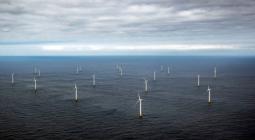Windfarms in Great Britain break record for clean power generation.

Forty per cent of Friday’s electricity was generated in windfarms thanks to blustery winter weather.
Blustery winter weather helped Great Britain’s windfarms set a record for clean power generation, which made up more than 40% of its electricity on Friday.
Wind turbines generated 17.3GW on Friday afternoon, according to figures from the electricity system operator, narrowly beating the previous record set in early January this year.
High wind speeds across the country helped wind power’s share of the electricity mix remain above 40% through Saturday. Coal and gas plants made up less than a fifth of electricity generated.
Melanie Onn, the deputy chief executive of Renewable UK, said: “It’s great to see our onshore and offshore windfarms have smashed another record, generating more power on a cold December day than ever before, just when we need it most.”
The record follows the “greenest” year ever for the electricity system thanks to a surge in renewable energy and sharp drop in energy demand caused by the shutdown of office blocks, restaurants and schools during coronavirus restrictions.
Solar power reached a record of 9.6GW in April, which helped spur the longest coal-free streak ever, of 1,629 consecutive hours, which ended in June.
Wind power generation reached a record share of almost 60% of electricity use in August as demand for power fell by more than a fifth compared with the year before.
The abundance of clean electricity caused the carbon intensity of the electricity grid in March fell to an all-time monthly low of 143g of carbon dioxide per kilowatt hour, and annual figures are expected to confirm that 2020 was the greenest year.
“We expect to see many more records set in the years ahead, as the government has made wind energy one of the most important pillars of its energy strategy for reaching net zero emissions as fast and as cheaply as possible,” said Onn.
“This new record is an early Christmas present we can all celebrate.”
19 December 2020
The Guardian







